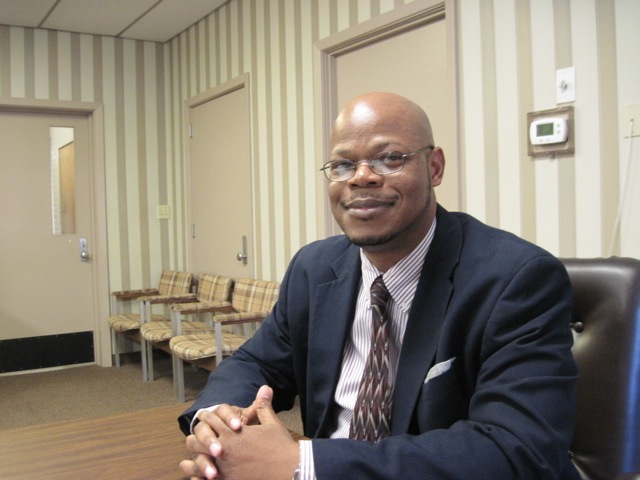
This story was produced in partnership with the Center for Public Integrity
Lionel Townsend will turn 14 in September and a few months after that he will be able to return to school, ending a year of exile.
Lionel admits he got into fights multiple times at Magnolia Middle School. When he was charged with vandalizing a school bus security camera, he was booted from school. He fought again in a community day program. The county Youth Court eventually put him on probation and an order to stay at home with an ankle monitor.
But the federal Department of Justice’s Civil Rights Division is alleging the juvenile justice system is so faulty it amounts to a “school-to-prison pipeline” in the Townsends’ home of Meridian.
“If you do wrong, you got to pay,” insisted Lionel’s mother, Ella Townsend, speaking in the living room of the home she shares with her mother, Lionel and four of the boy’s siblings. Lionel listens quietly, a skinny boy, who grins when attention is turned to him, or he’s teased about the sparkly blue earring studded in his ear. “But “that was harsh punishment,” she said, “I feel like they were sort of out of order.”
Townsend says her son’s ankle monitor was so sensitive it went off if he went in the back yard. The young man is rid of it now, but not before he gouged off the speaker, causing what Townsend said the court assessed as $1,500 in damage.
She worries if Lionel makes another mistake, he will end up in prison with adults, where he will learn the criminal trade.
The Justice Department says it has probable cause to believe the city of Meridian and Lauderdale County routinely and repeatedly incarcerate children for school disciplinary infractions, as outlined in an Aug. 10 open letter, at the end of an eight-month investigation. Their letter is addressed to the city and county, the county's two Youth Court judges, as well as the state Division of Youth Services, but not the Meridian school system.
The letter said infractions such as defiance, disrespect, dress code violations or cursing led to a police ride to the county Youth Court. City police in closed-door interviews called themselves a “taxi service” from school to jail, the DOJ writes. “MPD officers may subjectively believe that they are acting appropriately,” reads the letter, but the DOJ argues the police are wrong to automatically arrest children referred by the schools, instead of investigating and determining probable cause themselves. The police, they charge, do not assess “whether the alleged conduct qualifies as an arrestable offense.”
Once in custody, the Youth Court fails to give children speedy hearings, the DOJ says, by holding court only two days per week, thus on weekends and holidays pushing some children over a 48-hour threshold. Furthermore, “children and their guardians consistently report that they are not always appointed an attorney for detention or adjuration hearings,” reads the letter, adding an allegation that the public defender in the court does not provide “meaningful or effective representation.”
In cases of probation, children are inappropriately signing probation contracts that they do not comprehend, says the DOJ, and there “is no evidence that Lauderdale County and DYS [Mississippi Division of Youth Services] ever provide constitutionally required probable cause hearings.” DYS youth counselors — the DOJ calls them “probation officers” — in practice have “absolute discretion” to determine if there is a probation violation and what the consequence will be, according to allegations.
The federal agency also claims that African-American children are disproportionately suspended or expelled and that Meridian children who have disabilities are expelled or given long suspensions at a rate almost seven times higher than the state as a whole, though it does not quote detailed statistics.
The DOJ said it sought Youth Court records to supplement site visits, and interviews with police, DYS staff and community members. They were denied access locally on privacy grounds. In a written comment, a Mississippi attorney general spokesperson explained, “we have said that the Administrative Office of the Courts (AOC) will cooperate in any lawful manner with the DOJ investigation. However, state law, including Mississippi Code Section 43-21-261, prohibits the AOC from providing to DOJ copies of confidential youth court records without a court order.”
But the city of Meridian and Lauderdale County reject the charges, accusing the federal agency of basing their allegations on only “a few” cases and “unsubstantiated” claims, in a letter they wrote to the DOJ, which was released in response to media queries to the police and the Youth Court.
The findings of the DOJ are “one-sided and reflect, in our opinion, the inexperience and unprofessionalism of your investigating representatives as to basic criminal procedure,” write Meridian City Attorney Ronnie Walton and attorney for Lauderdale County, J. Richard Barry.
Meridian City Attorney Ronnie Walton and attorney for Lauderdale County, J. Richard Barry.
Youth Court judges Veldore Young and Frank Coleman “categorically deny any systematic violation of any child’s constitutional rights and have faithfully followed the laws of this State and will continue to protect the confidentiality of our children’s youth court records,” reads the attorneys’ Aug. 23 response.
They suggest the DOJ’s head civil rights lawyer is already biased against Meridian, accusing Assistant U.S. Attorney General Thomas Perez of running to the media instead of talking with judges; and of publicly criticizing Meridian schools.
They say the DOJ letter contains “outright untruths where it is stated that those judges would not cooperate” with the investigation by turning over juvenile court records. The attorneys say the judges do not have the legal right to hand over those papers.
After numerous requests for comment, a spokesperson from the Department of Justice wrote in an email that, “protecting the constitutional rights of youth is a top priority of the Justice Department. The department’s Civil Rights Division is tasked with ensuring and acting to protect the civil rights of children. If we find that a school district or juvenile justice system is depriving youth of their rights, we will not hesitate to act.
New School Year
Last year, Alvin Taylor was hired as Meridian school superintendent after several rapid changes of leadership. Much of the top administration turned over at the same time, he said, and his new team brought in new policies and procedures.
“I can’t speak on what happened before June 1, 2011,” said Taylor, referring to the day his work started.
Taylor’s 2011-2012 school year student handbooks lay out dozens of rule infractions and the punishments. Police only get involved, Taylor said, for three infractions named by Mississippi state law: weapons, drugs or serious violent acts.
A schoolyard fight is not considered a serious violent act, Taylor said, but gang fights or assaulting a teacher for example, is.
When school staff determine one of those three infractions has happened, said Taylor, a call to police must first be approved by himself or the assistant superintendent of student services.
He said less than 1 percent of youth get arrested in a given year in his roughly 6,200-student system. There are also around 60 or so expulsions every year, he said. Taylor said that expulsion rate is lower than average, according to his research.
As for the DOJ allegations that children who have disabilities — including learning disabilities — are disproportionally ousted from school, Taylor said, “all those accusations stem from 2009. And I can’t speak on what they did back then. I can tell you that’s not the situation now.”
In 2009, Meridian High School enrolled 1,625 students, according to the latest figures available in a federal Department of Education database. The same database says that among 205 Meridian High School students who have disabilities, there were 145 instances of children getting more than one out-of-school suspension. The student population overall was 86.8 percent African-American, and black students represented 96 percent of all out-of-school suspensions and 100 percent of the 10 reported expulsions.
Long-Smoldering Fire
The DOJ received the very first complaints about Meridian in 2005 from NAACP activist Randle Jennings. He was surprised when the city cut funding to a baseball program for at-risk youth he ran and considered very successful. He started looking at schools and asked why more than 90 percent of the teachers were white, given that there were five historically black colleges or universities within one hundred miles, and more than 90 percent of Meridian's students were black?
“We realized something was going on,” said Jennings, now the county NAACP education chair. “We smelled smoke,” but did not have an explanation for it. He sent the data about teacher and student demographics to the DOJ, and admits he did not know what they might find.
Five years later, in May 2010, the federal Department of Justice sent a letter to Lauderdale County’s and Meridians’ official attorneys. They were asking for records about school discipline and police involvement in schools. In the following months, the DOJ also participated in at least two public meetings where they asked area residents to come lodge their complaints about school discipline and the law.
Jennings is sure a pipeline runs through Meridian. “We have a concern for our children, especially the next generation because we have seen two generations be destroyed … [we] systematically need a plan so our children aren’t shoved in that pipeline.”
Lauderdale County juvenile inmates used to land in a detention center on the edge of town. However, it’s closed now and since the beginning of 2012, minors have been bused to a center some 70 miles away in Rankin County. Lauderdale’s center had been the subject of a federal lawsuit brought by the Southern Poverty Law Center over conditions of incarceration.
Get Rid of the Problem
The Love City Fellowship, a church in Meridian, hosted a public meeting on school discipline and the law in August 2010. The church, the DOJ and the Southern Poverty Law Center invited parents to come to the afternoon meeting to talk about suspensions and arrests from city schools. Some church members are still collecting stories from friends and neighbors and urging parents to talk to the DOJ.
“Some of the rules that are in place do not put the child in mind first,” said Senior Pastor Lamorris Richardson. “Instead of having to deal with the problem and find a solution, it’s more ’get rid of the problem.’”
The city school system is separately in a dispute with the DOJ that is very closely related to the newly-announced allegations against the city and county. The school system is a party in a 1960s-era federal desegregation order. The DOJ reopened that case in 2010 in an effort to investigate the discipline complaints and other complaints that the district was allegedly unfairly terminating African-American educators.
In that case, besides asking for data, the DOJ asked for access to visit schools and interview staff in 2010. The school district initially rejected those DOJ requests, and the DOJ responded by asking the federal court to order access and document release. According to court filings, the school argued the demand to visit and interview staff and law enforcement officers is too broad and amounts to “fishing” for information, as does a DOJ request to inspect databases and documents on site at schools. That battle over visits, interviews and inspections is ongoing in court and forms the background to the DOJ’s August letter and threat to sue the city and county.
Pastor Richardson said his city needs a school board picked by the community. Now it is named by the mayor and confirmed by city council. Though, according to Elizabeth McDonald, spokeswoman for the school district, the board members each represent different areas of the city.
The board is currently made up of three whites and two blacks.
“This city has not moved in how many decades? … Five decades?” asked pastor Betty Alford, also of Love City Fellowship, comparing treatment of African-Americans now to the 1960s.
Richardson added, “No community, in 2012, should be still dealing with practices that applies [only] to a certain group, a certain community where kids rights are not being protected in school. We should be way past this kind of bias.”
But Meridian children like Lionel are out of Superintendent Taylor’s hands. Once a child is expelled, the child is not a “student” and the school board is not obligated to instruct him.
That being said, the schools, in partnership with the city and local groups, will this year start a pilot program for expelled students that provides character and academic education, as well as technical options. It will have 18 slots and is set to start in September. That will be the only full-time educational opportunity for students expelled from school.
As for Lionel, Ella is teaching him at home until he goes back to school, though she said it is not enough. “I can do stuff from what I know, but I’m not a trained teacher,” she said. “He needs to eat his material, he needs to study and learn.”
Click here for other examples of the school to prison pipeline around the country.
